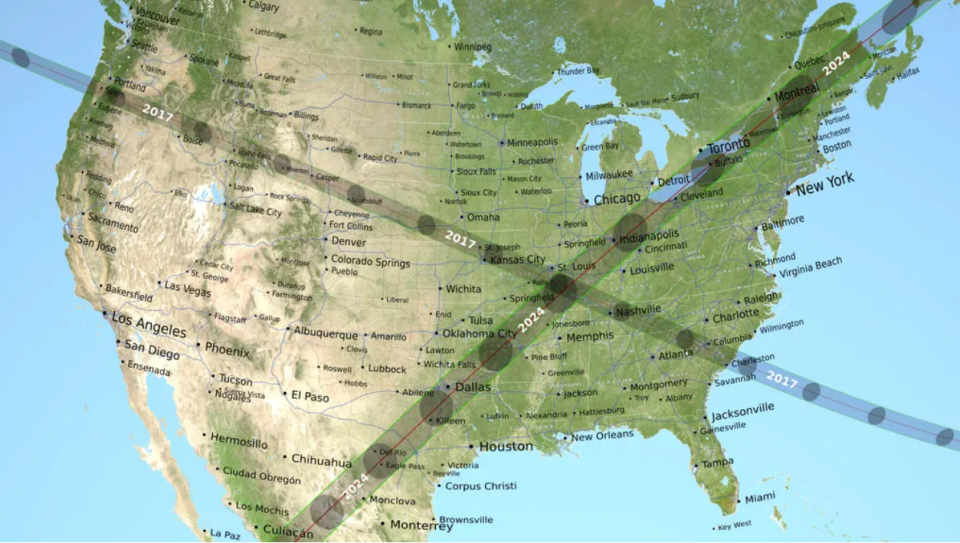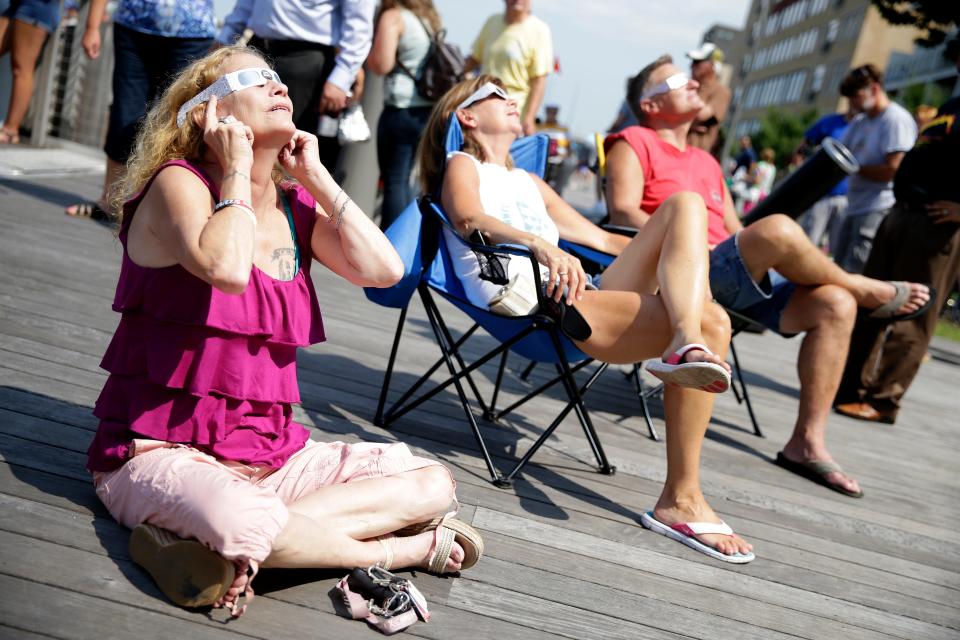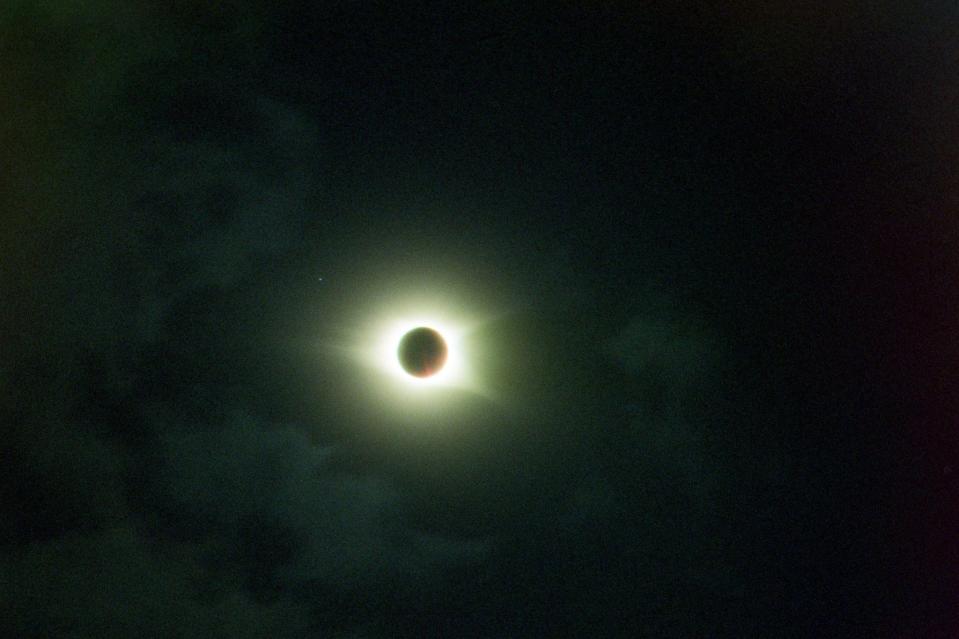Should pregnant people really not watch the eclipse? Myths, folklore surround astronomical event
Astronomy nerds and eclipse enthusiasts (and of course, the general public) will be eagerly awaiting Monday, April 8 to witness a once-in-a-lifetime celestial phenomenon — a solar eclipse.
Or is something else going on? Maybe an extremely large, mischievous black squirrel chewing on the sun or the infamous Norse god, Loki, attempting to steal the fiery star for revenge.
Okay, maybe it's not either of those but you should definitely warn everyone you know about upcoming bad events happening due to the eclipse, right? Maybe not that either.
With any natural phenomenon on our planet, many myths and folklore have been associated with eclipses since the dawn of time. Below is a roundup of the top ones about solar eclipses, along with explanations. Perfect for easing your own worries about the event or having a conversation starter for the upcoming week.
When is the total solar eclipse in April 2024?
The total solar eclipse will cross North America on Monday, April 8, 2024. The total eclipse will darken the coast of Mexico on April 8, about 11:07 a.m. PDT and leave the continental North America at 5:16 NDT.
The partial eclipse will begin first as the edge of the moon becomes visible, and then about an hour and 20 minutes later the totality will begin and last for three or four minutes before the sun begins to appear again.
How much of the eclipse will be visible in Florida?

Florida is not in the path of totality for the April 8 solar eclipse, so residents won't see the moon completely block the sun.
Residents will see a partial eclipse, though. Anywhere from 54 percent of 82 percent of the sun will be covered during the eclipse, depending on where you are in Florida, with those in the northwest corner of the Panhandle will see the most coverage (think Pensacola).
MYTH: If you are pregnant, you shouldn't watch an eclipse because it can harm your baby
According to NASA, an age-old myth warns women who are pregnant should not watch an eclipse because it can harm their baby. It stems from the false idea that harmful radiations are emitted during a total solar eclipse.
Many ancient people worried an eclipse caused pregnancy issues such as blindness, cleft lips, and birthmarks, according to the Old Farmer's Almanac.
"Even today, pregnant women are sometimes warned to stay inside, not eat, not carry sharp objects, and not eat cooked food from prior to the eclipse," according to the Old Farmer's Almanac.
"This is an entirely harmless effect and would not harm you, or if you are pregnant, the developing fetus," according to NASA.
MYTH: An eclipse will poison any food prepared during the event

This myth is also related to the fear of radiation: the claim that during a total eclipse the corona emits emits electromagnetic radiation that can cause blindness, according to NASA.
So the thinking is radiation will harm food. If that were the case, all food in your pantry and crops yet to be harvested would be affected.
While the ghostly green corona may look frightening, don't look for coincidences, NASA warned.
MYTH: Eclipses are omens and predict something very bad is about to happen
Have any relatives or friends started getting agitated by the upcoming celestial event or even expressed fear?
While many get excited to experience the beautiful, natural phenomenon, solar eclipses can also evoke fear for others. Many people see eclipses as omens that can predict something bad can happen — death, destruction and disasters.
Luckily, NASA has an explanation for why, writing: "A classic case of what psychologists call 'Confirmation Bias' is that we tend to remember all the occasions when two things happened together, but forget all of the other times when they did not.
"This gives us a biased view of causes and effects that we remember easily, because the human brain is predisposed to looking for, and remembering, patterns that can be used as survival rules-of-thumb. Total solar eclipses are not often recorded in the historical record, but they do tend to be recorded when they coincide with other historical events.”
MYTH: Solar eclipses foretell major life changes and events about to happen
On the more positive end, some willingly look towards the eclipse for a glimpse into the future. It’s no secret that celestial events are tied to astrology and predictions of the future, with phrases like “when the stars align” or “once in a blue moon."
Solar eclipses don’t actually have a foreshadowing ability, but it is common in astrological forecasts, which are “based on coincidences and non-scientific beliefs in how celestial events control human behavior,” NASA states.
Confirmation bias is present here, too, according to the NASA post about solar eclipses and myths: “A common qualification is that if the eclipse doesn’t foretell a change in your life it may foretell a change in that of your friends. This is a logically flawed used of confirmation bias in which you prove a cause-and-effect relationship by ignoring failures and only consider successful forecasts. There is nothing other than human psychology that connects eclipses with future events in your life," NASA states.
MYTH: Solar eclipses 6 months after your birthday, or on your birthday, are a sign of impending bad health
"There is no physical relationship between a total solar eclipse and your health, any more than there is a relationship between your health and a new moon.
"Among a random sample of people, you may find such correlations from time to time but they are outnumbered by all the other occasions during which your health was excellent," NASA said.
Don't believe it? Check back on Oct. 8.
MYTH: The moon turns black during a total solar eclipse

The moon turning black during a total solar eclipse is actually a trick of the eyes — sort of.
According to NASA: "As viewed from the moon, Earth is very bright in the sky and its weak light is enough to turn the lunar surface a pale milky white. This is called earthshine, and the same thing applies during a total solar eclipse. Most of Earth’s surface is actually in broad daylight off the path of totality, and from the moon it would be in full phase, shining down on the lunar surface at its brightest. So, during a total solar eclipse, the lunar surface will be dimly seen due to earthshine, surrounded by the much more brilliant corona of the sun.”
FOLKLORE: See how other cultures responded during an eclipse
The Old Farmer's Almanac shared folklore associated with an eclipse:
Fear led Chippewa people to shoot flaming arrows into the sky to try to rekindle the sun. Tribes in Peru did the same for a different reason; they hoped to scare off a beast attacking the sun.
In Indonesia and Polynesia, Rahu consumes the sun — but burns his tongue and spits it out.
In Transylvanian folklore, an eclipse stems from the angry sun turning away and covering herself with darkness, in response to men’s bad behavior.
In India, many believe an eclipse happens when a dragon is trying to seize the sun and moon. People immerse themselves in rivers up to their neck, imploring the sun and moon to defend them against the dragon.
In Tahitian myth, the sun and moon are lovers who join up — providing an eclipse — but get lost in the moment and created stars to light their return to normalcy.
In Bohemia, miners believe an eclipse means good luck in finding gold.
Another myth shared by KidsEclipse said that in Japan, people once believed poison dropped from the sky during an eclipse. To prevent the poison from dropping into their drinking water, they covered all the wells during an eclipse.
In Norse culture, the evil enchanter Loki is chained by the gods. He gets revenge by creating wolflike giants, one of which swallows the Sun. Another of the giant wolves chases the moon, trying to eat it.
FOLKLORE: Legends depict the sun being eaten
Many legends explain an eclipse as the sun being eaten and what people did to have it return to normal.
Exploratorium gathered these legends from around the world:
In Vietnam, legend has it that a giant frog swallows the sun. Its master, the lord of Hahn, convinces the frog to spit it out.
In Javanese mythology, the god of darkness, Batara Kala, swallows the sun. Javanese villagers try to make Batara Kala release the sun by offering sacrifices and beating drums.
In Andean mythology, a puma devours the sun. To prevent the sun’s death, the puma must be frightened away by the screams of children and the cries of animals.
According to Choctaw legend, a mischievous black squirrel gnaws on the sun.
In the U.S. Northwest, the Pomo people’s name for a solar eclipse is “Sun got bit by a bear.” They tell a story about a bear who goes out for a stroll along the Milky Way. The bear meets up with the sun, and the two begin to argue about who will move out of the other’s path. The argument turns into a fight, which is the eclipse.
In ancient China, it was commonly held that a celestial dragon attacked and devoured the sun. To frighten away the dragon and save the Sun, people would bang drums and make loud noises.
Emperors, kings, and rulers throughout history have been nervous about eclipses, with court astrologers interpreting them that the monarch’s power was in danger. In ancient Babylon, there was the practice of hiring “stand-in” kings to sit on the throne during an eclipse, so any harm would come to them instead of the real king, according to the Farmers' Almanac.
This article originally appeared on Fort Myers News-Press: Eclipse solar 2024: Myths, folklore, facts surrounding why

